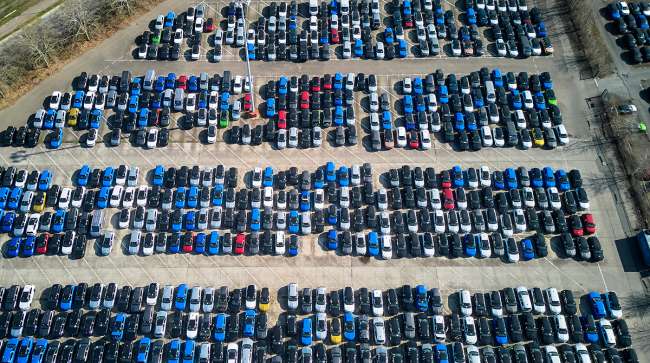Opel cars are parked at the Opel car factory in Ruesselsheim near Frankfurt, Germany. (Michael Probst/AP)
FRANKFURT, Germany — European automakers, already struggling with tepid economic growth at home and rising competition from China, on March 27 decried the U.S. import tax on cars as a heavy burden that will punish consumers and companies alike on both sides of the Atlantic.
The new 25% import tax announced by President Donald Trump on March 26 “will hurt global automakers and U.S. manufacturing at the same time,” the European Automobile Manufacturers’ association said in a statement.
The head of Germany’s auto industry association, VDA, said the tariffs would weigh on carmakers and every company in the deeply interwoven global supply chain “with negative consequences above all for consumers, including in North America.”
“The consequences will cost growth and prosperity on all sides,” Hildegard Müller said in a statement.
📉 German auto shares dip as Trump announces 25% tariffs on imported vehicles, posing risks to the struggling industry. The VDA warns of negative impacts on global trade, but research indicates Germany may not face the worst effects. Calls for US-EU nego… https://t.co/wV9dls73xa
— Global Banking & Finance Review (@GBAFReview) March 27, 2025
The stakes are enormous for BMW, Volkswagen, Mercedes-Benz, Volvo, Stellantis and their vast network of suppliers, as well as the entire European economy.
The U.S. is the biggest export destination for the European auto industry and in 2023, European automakers exported 56 billion euros’ worth of vehicles and parts to the U.S.. Europe’s auto industry supports 13.8 million jobs, or 6.1% of total EU employment.
Nick Darman of Alvys discusses the evolution of transportation management systems and workflow automation, while David Bell of CloneOps.ai shares insights from the Manifest 2025 supply chain innovation conference. Tune in above or by going to RoadSigns.ttnews.com.
Europe’s carmakers already face a shrunken domestic market and new competition from cheaper Chinese electric vehicles. Any trouble in the auto industry would weigh on a European economy that did not grow at all in the last quarter of 2024 and just 0.9% for the entire year.
The most exposed are German and Italian carmakers since 24% of German and 30% of Italian non-EU exports go to the U.S. Germany is home to major automakers such as Volkswagen, Mercedes-Benz and BMW.
“This would deliver a substantial blow to a sector that not only sustains millions of jobs but also contributes to a large proportion of the bloc’s GDP,” wrote analyst Clarissa Hahn at Oxford Economics. She estimated a decline in German exports of 7.1% and a fall of 6.6% for Italian ones.
U.S. carmakers are less exposed to possible retaliation because they export only 2% of their production to the EU. Still, shares of Detroit’s Ford and General Motors tumbled sharply before the opening bell in the U.S. on March 27 because the U.S. industry relies heavily on cross-border trade by suppliers.
“The EU and the U.S. must engage in dialogue to find an immediate resolution to avert tariffs and the damaging consequences of a trade war,” the European manufacturers’ association said.
German auto association head Müller called for immediate negotiations between the EU and U.S. on a bilateral agreement that would offer “a forum to discuss the various tariff and non-tariff barriers for automobile products and could lead to a more balanced approach.”







